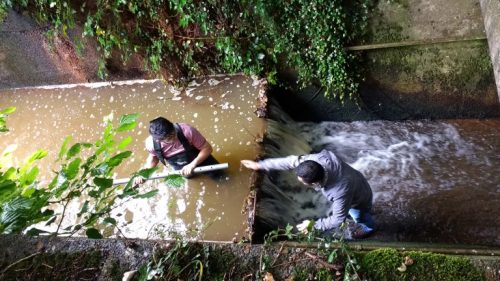Expanded Exchanges with Imperial College London

An MIT UROP student and Imperial PhD student measuring the water height of a channel in Imperial’s Silwood Park campus, located outside of London.
Building on the success of existing programs with Imperial College London, the Global Education Office (GEO) is significantly expanding its academic exchange with Imperial, while continuing to grow the Imperial summer research exchange. Twelve MIT departments will now take part in one or both exchanges. These augmented multi-departmental exchange programs will allow even more MIT undergraduates to participate in rigorous and enriching study abroad and research experiences at Imperial, a leading United Kingdom university that focuses exclusively on science, engineering, medicine, and business.
The academic exchange is transforming from a departmental exchange spanning two departments to a multi-departmental exchange involving nine departments. These new departments, joining materials science and engineering and nuclear science and engineering, are: mechanical engineering; chemistry; electrical engineering and computer science; chemical engineering; earth, atmospheric and planetary sciences; aeronautics and astronautics; and mathematics.
The first two students will be going to Imperial on the exchange this fall, and an additional six will study there in the spring. This will initiate a two-year pilot for the exchange. Students apply through GEO and are selected jointly by faculty in their MIT department and GEO staff. While on the exchange, students study on Imperial’s campus, which is located in central London’s posh Kensington and Chelsea neighborhoods steps away from such cultural attractions as the Science and Industry Museum, Royal Albert Hall, and numerous music and restaurant venues. Students take academic subjects that provide MIT transfer credit for core or restricted-elective subjects in their majors. In addition, Imperial offers UROP-like experiences whenever possible.
The summer research exchange with Imperial has been growing steadily, from two departments in 2013 to 10 currently. This program is a partnership among GEO, the UROP Office, and the participating academic departments. The research exchange is now open to undergraduates in civil and environmental engineering, materials science and engineering, chemistry, electrical engineering and computer science, physics, chemical engineering, aeronautics and astronautics, mathematics, biological engineering, and nuclear science and engineering. Each department nominates two students for the program, and up to 20 students can participate from each university each year. The faculty coordinators work closely with their counterparts at Imperial to identify labs, faculty supervisors, and advisors for participating students to make this experience possible. The research exchange runs from late June through mid-August for both groups of students.
—Julia Mongo, GEO/CAPD
